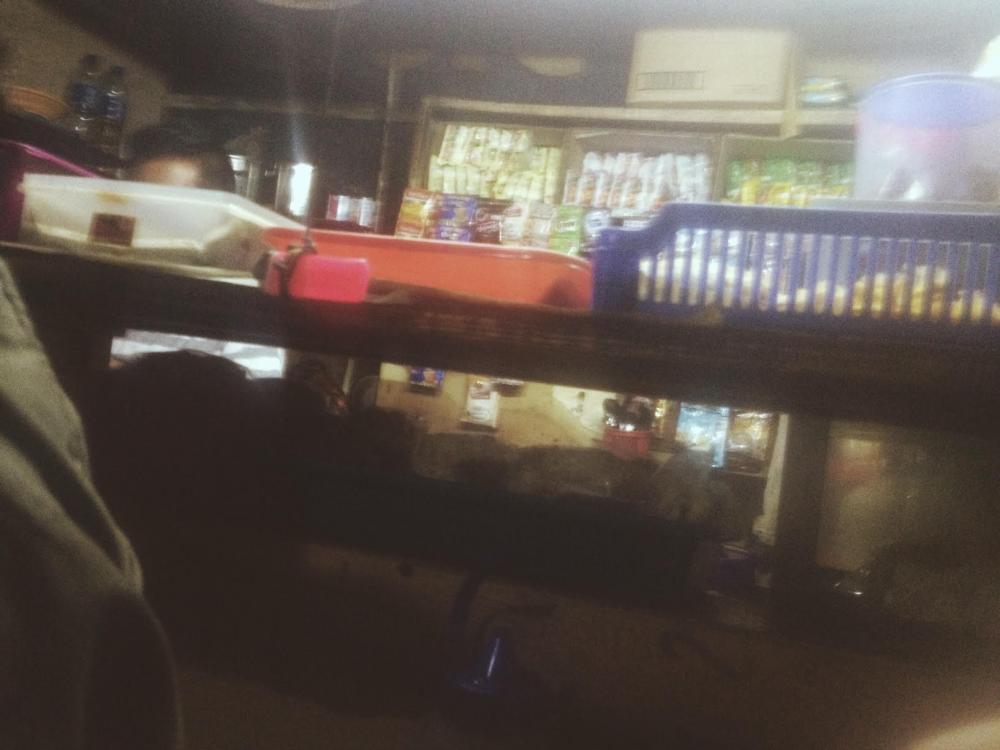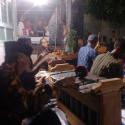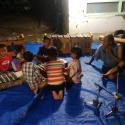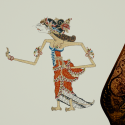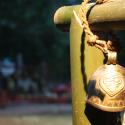The warkop (warung kopi) is a place where all people from all walks of life can converge and are equal, regardless of race, occupation, or where they come from. It serves as the daily newspaper, it serves as the debate room and it serves as the music studio. The warkop knows no prejudice and no sense of entitlement. People coming home from work downtown in the city are able to stop by any warkop and enjoy an evening brew of kopi hitam before the traffic on the commute home. To some, the warkop becomes an extension of their living room, often staying hours on end. The idea of new faces and new topics to talk about is an appealing thought to accompany those tired from the daily grind. Those who come for coffee, stay for company and conversation.
I find myself sitting at a warkop in the area of Minangkabau, which happens to be more popular in the night than its daytime business hours. It’s fluorescent lights give glow to the insomniacs, hungry junkies and 7-Eleven parking staff in search of a midnight snack and cup o’ Joe. Dika the stall owner paces back and forth constantly, never really getting a rest during the shift. Whether its bringing coffee to the abang-abangan of the local Pemuda Pancasila chapter or cooking Indomie for underfed elderly trash scavengers, Dika incessantly moves back and forth from customer to customer.
In the early 2000’s, Dika was one of thousands of people who made the exodus from the daerah (countryside) to the nation’s capital in hopes of providing money and putting food on the table for their families back home whilst searching for a new life. He traveled to Jakarta from Kuningan in the province of West Java, accompanied only by his wife and daughter. Originally working as a construction site worker, Dika was offered the opportunity to become a warkop stall owner when one of his neighbors rented out a space right next to a stretch of counterfeit instrument stalls. The thought of cooking food and preparing coffee was a much better option to Dika than toiling in the hot sun constructing buildings for little pay.
Still though, Dika doesn’t make that much money. He has just enough to feed his family, put clothes on their back, and pay for his child’s schooling; which Dika says is the most important thing to him: ‘biar dia ga kayak bapaknya, biar bisa jadi orang penting’ (so that she doesn’t become like her father, so that she can become an important person.)
Funnily enough though, a majority of those who come to Dika’s warkop are well off and can afford a number of amenities such as motorcycles, touchscreen handphones, and most importantly, their own houses. Quite opposite to Dika, who is only able to afford very few of what we take for granted; his only real prized possession being his CD/Tape/AUX speaker set, which blares dangdut hits into the night.
All of us here at the warkop have our smartphones, our motorcycles, and our own beds to sleep in. Meanwhile, Dika prepares the next batch of fried assortments as his wife and child cough in their 1 x 2 meter wooden/cardboard ‘bed’, fashioned perfectly symmetrical below the cigarette counter, hoping for some shuteye before the day shift.
When morning light comes, Dika takes his wife and daughter’s place underneath the counter and we all go back to our mattresses in comfortable bedrooms.
A story like Dika’s is not unfamiliar and unheard of to the ears and eyes of those in Jakarta. Everyday and everywhere we are exposed to both sides of the coin. One being a life of lavishness where supercars zoom by upper-class malls, decked from basement to top floor in designer stores and the other being a life where entire families scavenge for scrap garbage to sell for a daily meal of rice. There are millions of people who are just like Dika, be it living out of a warkop or a gerobak (cart), these are the ghosts of our society. Ghosts that live on the support beams under bridges, the side of the railroad tracks, and on empty storefronts.
“Setidaknya, keluarga gue masih punya tempat tinggal, Le. Bersyukur gue.” (At least, my family has a place to stay, Le. I’m grateful) Dika tells me during one of his rare short breaks where he has a chance to just sit down on the warkop bench. “Coba kalo gue ga jadi nih megang warkop” (What if I wasn’t the one to be in control of this warkop?) “Terus entar bini gue ama anak gue masa di tinggal?” (I can’t just leave my wife and kids).
It is clear that what Dika does is mainly for his family and loved ones, its funny that hard-working people, especially those in the lower social and economic class are those who are most overlooked. They are your waiters/waitresses, drivers, maids, trash collectors, and local warkop owners.
As the night goes on and the customers slowly recede, after all orders isare completed, he sits down to light a cigarette, glances at his phone, takes a few puffs, and jumps once again at the sound of:
“Dik, kopi item atu, Dik!” (Dik, one black coffee!)

